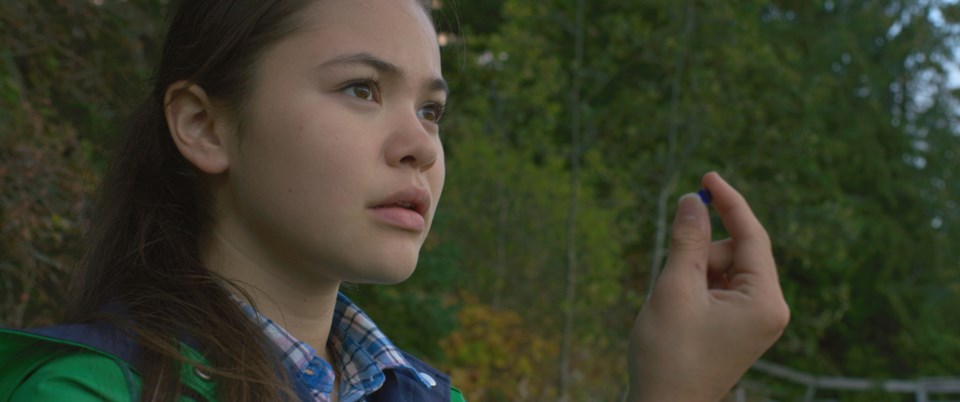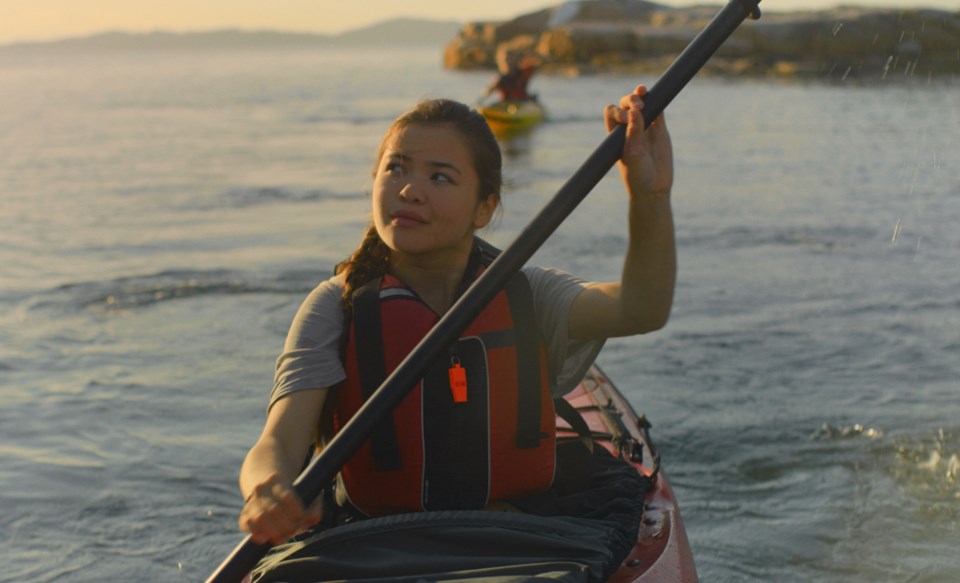When the Northern Gateway Pipeline announced plans to bring tanker traffic into the inside passage along B.C.’s coast, the Heiltsuk Nation in Bella Bella invited its members to give testimony about the impact this traffic would have on the water, the land, and its people.
Over the course of four days, a steady stream of Heiltsuk people stepped up to a microphone and voiced their gravest concerns about the future of the waterways — and Zoe Leigh Hopkins recorded every single word.
“It was my responsibility to document all of the testimony that my people put down, and I sat behind the camera and cried for four days while people spoke out about our land and our traditions,” says Hopkins, a screenwriter and director who hails from the Heiltsuk fishing village.
Plans for the Northern Gateway Pipeline were ultimately scrapped – mainly due to the relentless and vehement outcry from First Nations communities — but the debate over pipelines rages on.
Hopkins’ visceral response to the testimony she witnessed — and the emotionally charged protests that continue to accompany pipeline projects — power Kayak to Klemtu, the narrative feature film that Hopkins co-wrote and directed.
Kayak to Klemtu stars Ta’Kaiya Blaney as Ella, a Heiltsuk teen who makes the 500 km journey from Vancouver to the remote island of Klemtu by kayak in order to fulfill her late uncle’s wish and give testimony at a hearing much like the one Hopkins documented. The feature also stars Lorne Cardinal (Corner Gas) as her surviving uncle and Sonja Bennett (Preggoland) as her late uncle’s widow.

Kayak to Klemtu premiered at 2017 ImagineNATIVE and won Best Canadian First Feature at the Victoria Film Festival; the film will screen at VIFF’s Vancity Theatre on July 21 and 23. “I’m really looking forward to screening it in Vancouver because I know it’s going to resonate more than other places I’ve shown it,” says Hopkins.
Hopkins and co. filmed on location in Bella Bella and Klemtu — and on the ocean, an experience that claimed an expensive drone. “Drones don’t like to be launched from a moving vehicle on the water,” she learned.
Days after production wrapped, a tugboat pushing an American fuel barge ran aground and spilled 200,000 litres of diesel near Bella Bella.
It took 33 days to recover the boat, while fuel spread for miles, destroying the Heiltsuk fishery.
“One thing I wanted to convey to kids and young people through this film is that the ocean is a global concern,” says Hopkins. “It’s not territorial to a race of people. It affects all of us.”
But this point is often lost in debates around pipelines, which tend to be steeped in racism, Hopkins says.
“With any environmental concern, especially ones that involve First Nations territory, I think that the misconception in the media or in social media is that it is quote-unquote an Indian problem,” says Hopkins. “Yes, absolutely it affects our culture and our traditions and our way of life that goes back millennia, but it should be a global concern. That’s something that’s missed when these things are responded to in a racist way.”
But Kayak to Klemtu isn’t just about tanker traffic and territorial waterways; it’s also a family film, with complicated interfamilial relationships and a compelling coming-of-age arc for Blaney’s Ella.
By placing the pipeline issue within a family film, Hopkins hopes to reach young audience members “who haven’t yet formed a political opinion about these things, [and] who haven’t yet come to the realization that they don’t know a lot about First Nations people on the coast. It’s a way to reach people who won’t necessarily go to see a documentary about this topic.”
In June, Kayak to Klemtu won two Leo Awards: Best Supporting Performance by a Female in a Motion Picture for Bennett, and Best Lead Performance by a Female for Blaney.
“Ta’Kaiya’s just a fireball,” says Hopkins of Blaney, a young musician, actress, and activist from the Tla’Amin First Nation who in 2014 addressed the United Nations about the rights of Indigenous children and youth.
“I’m so proud to have the real girl in this movie,” marvels Hopkins. “She said to me that she has said so many of the things that are in the script in real life, and I think that made it just so much more of a passionate performance, because these are things that she’s passionate about in her life as well.”
Kayak to Klemtu screens July 21 and July 23 at VIFF’s Vancity Theatre; a performance by the Urban Heiltsuk Dance Group will follow the July 21 screening. Tickets at https://www.viff.org/Online/default.asp?BOparam::WScontent::loadArticle::permalink=fc9803-kayak-to-klemtu


